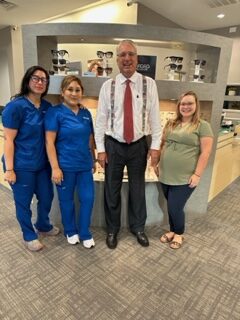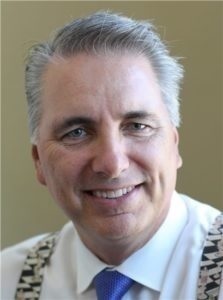
Dr. Krivacic with his practice team. He says that Mike Krzyzewski has taught he and his team valuable leadership lessons via the Hulu series, “The Bear.”
Leadership lessons for your practice from the “winningest” coach in college basketball.
By Ken Krivacic, OD, MBA
Sept. 6, 2023
I’ve been watching a series on Hulu called “The Bear.“ It revolves around a chef who takes over a rundown sandwich shop and then closes it down to remake it into a world-class restaurant. Leadership lessons for us as practice leaders abound in this scenario.
There are many similarities between an optometric practice and a restaurant. Most successful restaurants have a few basics that need to be met to survive and then thrive: an engaging environment, an attentive and educated staff, a tasty menu and management that keeps everything together and moving forward.
Similarly, an optometric practice needs those basics also: an attractive office environment, an engaging and educated staff, good products (frames, lenses, contact lenses and competent doctors), and finally, a leader who makes it all work and keeps everyone and everything moving forward. For the purposes of this article, let’s concentrate on the leadership aspect.
In an episode of “The Bear,” one of the team leaders is reading a book by Mike Krzyzewski about leadership. The episode begins with an interview of Krzyzewski about what he thinks makes a good leader. Mike Krzyzewski is the “winningest” coach in college basketball history with 1,202 victories. He coached Duke University from 1980-2022 and won five national championships and led his team to 13 final four appearances, the most of any coach. Yet with all that success, he says he’s still learning the art and science of leadership.
This interview snippet provided us with a few guidelines for leading our practice:
Let’s discuss a few points that Coach K highlights.
You Won’t Get There Alone
Coach K talks about being part of a team. It takes a group effort to get where you want to be, you cannot do it alone. He emphasizes the importance of surrounding yourself with good people. Optometry is a people business, so we need to do the same. Make sure you hire the best person for the job, not just the one who can start right away or is asking for less money. In the long run, good people will make the practice more revenue and they will save you money. If they have a vested interest in being part of the team, they will make the entire team better.
Many of the things we currently do in our practice came from ideas from employees. For example, years ago, a staff member recommended we open at 7 a.m. for appointments. At the time I thought that was crazy. “Way too early in the day,” I said. “Nobody wants to get an exam that early, we’ll have a ton of no-shows.”
The employee, who worked the front desk, said she had gotten numerous requests for earlier hours. We tried it out for a few months, and much to my surprise, those appointment spots where constantly full and no-shows were minimal. In retrospect it made sense. Our office was close to many large corporations and patients appreciated that they could get their exams and not have to miss much work. This brings me to Coach K’s second suggestion for good leadership:
Learn How to Listen
Krzyzewski advises: “Learn how to converse, not talk.” There is a wonderful distinction in that sentence. Too often as practice leaders we are telling people what to do. Even though that comes with the position, we as leaders need to learn to listen to our staff.
Staff meetings became a part of our practice. Part of those meeting entailed telling staff what we wanted to happen in the practice, including new products, new services, education and other improvements. Yet we also devoted a portion of the meeting to asking for suggestions from the staff. In the beginning, as a leader it was difficult for me to not interrupt – “We tried that before,” “I don’t think that will work,” etc. Slowly I realized that it would be better if I just shut my mouth and listened. Staff have different perspectives of what’s going on in the practice. As practice leaders most of us are in the exam room most of the day or in a back office. Let your people come to you with ideas.
Other Articles to Explore
Listening also makes your staff feel important. They are not just an employee; they are also helping to guide the practice.
Love What You Do
“Love what you do” is easy to say, but some days it’s difficult to maintain. Fortunately for me, I enjoyed building and growing a practice. It was difficult and demanding, but with growth and success came a sense of pride and accomplishment. Of course, there were days when I could have just as easily stayed home. We all need to find things we enjoy that keep us motivated. Often it is the small things that enable us to love what we do.
Recently I had a young girl come in for an eye exam who was new to our practice. She carried a great smile on her face and was very polite as I performed the exam. She was interested in contact lenses. I consulted with her mother who was sitting in the exam room and she told me previous doctors had discouraged contact lenses due to her high astigmatism. She did have -2.75 of cylinder OU, but her motivation seemed genuine. Luckily, we had a pair of daily-disposable trials with her prescription, and soon after I put the first lens on, her face lit up. She smiled even more and told her mom, “This is great, I can see without my glasses.” Her thrill became my thrill, and is one of the reasons I love what I do.
Find those little things in your practice that keep you getting up every morning and looking forward to leading your practice.
Finally, there is a great story of how Coach K constantly looked for ways to motivate his players. He was asked to coach the USA national team several times during his career. One of the challenges he faced was how to motivate professional basketball players to come play for the national team and give full effort. After all, these were well-paid professionals, the best in the game and he was just a college coach. They all had big egos. How do you get someone, who is elevated to a high pedestal already, to buy into what you are doing? He told them, “You are not playing for USA Basketball; you ARE USA Basketball.”
In your practice, are your employees working for XYZ Eye Clinic or are THEY XYZ Eye Clinic? Find what it takes to motivate your team and become a leader that others enjoy working for.
 Ken Krivacic, OD, MBA, practices at Las Colinas Vision Center in Irving, Texas, now a MyEyeDr. practice. To contact him: kkrivacic@aol.com.
Ken Krivacic, OD, MBA, practices at Las Colinas Vision Center in Irving, Texas, now a MyEyeDr. practice. To contact him: kkrivacic@aol.com.

























